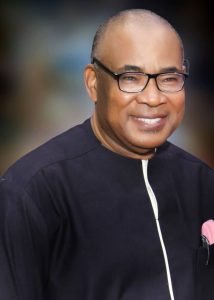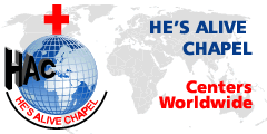
Text: Gen. 16:1-14; 21: 8-21; Isaiah 63:15-16.
The song “I have a Father” written by Tommy Walker captures the essence of the Fatherhood of God. We have a Father. Our Father is a Heavenly Father. What does our Father do? He cares, he provides, he protects, he supports us in our weaknesses. Our Father helps us when we cannot help ourselves. Our Father helps us in our sufferings and distress.
Hagar was a woman who enjoyed the favour of God at different times in her life when she faced crises. The two instances when she enjoyed God’s favour can be found in Genesis 16 and 21. Both instances illustrate the Fatherhood of God. In Genesis 16, while Hagar was in the wilderness at Shur, the Angel of the LORD came to her. In verse 8, the angel of God asked a question, “And He said, “Hagar, Sarai’s maid, where have you come from, and where are you going?” She said, “I am fleeing from the presence of my mistress Sarai” (Genesis 16:8 NKJV). The angel of God then counselled her to return and submit herself to Sarai and promised that her son would become head of a great nation.
Recognizing the Angel as God and ascribing a new name to Him arose from Hagar’s astonishment at having been the object of God’s gracious attention. The revelation led her to call Him, “The One Who Lives and Sees Me” (v. 14). El Roi is one of the names of God in the Hebrew Bible. Our Father is El Roi.
Few years after Hagar’s experience, Ishmael was born. Abram was 86 years old when Ishmael was born to Hagar. The name Ishmael means “God hears.” In this case, God heard Hagar’s misery.
HAGAR IN THE WILDERNESS OF BEERSHEBA
The second story in Genesis 21, happened after Ishmael and Isaac had been born. Sarah caught Ismael scoffing or mocking at Isaac. She felt offended and perhaps jealous. She did not want Ishmael to be an heir with Isaac. So, she prevailed on Abraham to ask Hagar and her son, Ishmael to depart. Abraham was reluctant about Sarai’s request to send Hagar and her son, Ishmael away. Strangely enough, God said to Abraham, “Listen to her voice.” Abraham then sent Hagar away with bread and a skin of water.
Hagar departed into the wilderness of Beersheba feeling disappointed and abandoned. When the bread and water got exhausted, she took her son Ishmael and kept him under a shrub and went and sat in the opposite direction, and “lifted her voice and wept.” She did not want to witness her son die of hunger. At that point, God heard the voice of her son and came to her. God opened her eyes and she saw a well of water from where she got water to give to her son to drink. Thereafter, God was with Ishmael all through in the wilderness.
On both occasions, Hagar felt rejected, abandoned, neglected, lonely. In her distress, God did not abandon her, God appeared to her as the God who sees and cares. In the first instance, God appeared to her as El Roi. In the second instance, God opened her eyes to see how her need could be met.
God discovered Hagar in her misery, in her suffering, he discovered her in her greatest hour of need. He remembered her and took care of her and the baby.
To understand God as a Father we must have a Father-son relationship. Hagar’s experiences with God must have made her understand God as a Father who cares, a Father who shows up in the time of need, a Father who does not abandon his own when we need him most.
GOD demonstrated in Hagar that he is a Father to the broken-hearted, a Father to the helpless, to the rejected, a Father to those who are abandoned and a Father to those who are in pain and need.
ANXIETY DUE TO THE IMPACT OF COVID-19
COVID-19 has increased the level of anxiety with many of us. Many are worried and afraid about their jobs, about their family, about their future, and their health. Many are crying due to the pains brought about by COVID-19. If you are one of them, I want to assure you that you have a Father in God who will not abandon you.
In the book of Isaiah God uses some striking imageries to show Israel whom he is. First, he contrasts himself to a woman who lost compassion for her child and says though a woman may forget her child, he will never forget Israel.
“But Zion said, “The LORD has forsaken me, And my Lord has forgotten me.” “Can a woman forget her nursing child, And not have compassion on the son of her womb? Surely they may forget, Yet I will not forget you. See, I have inscribed you on the palms of My hands; Your walls are continually before Me.”
(Isaiah 49:14-16 NKJV).
In the second imagery, God describes Himself as Israel’s Maker, her husband and as her Redeemer. These are apt pictures of who our heavenly Father is.
“Do not fear, for you will not be ashamed; Neither be disgraced, for you will not be put to shame; For you will forget the shame of your youth, And will not remember the reproach of your widowhood anymore. For your Maker is your husband, The LORD of hosts is His name; And your Redeemer is the Holy One of Israel; He is called the God of the whole earth. For the LORD has called you Like a woman forsaken and grieved in spirit, Like a youthful wife when you were refused,” Says your God. “For a mere moment I have forsaken you, But with great mercies I will gather you. With a little wrath I hid My face from you for a moment; But with everlasting kindness I will have mercy on you,” Says the LORD, your Redeemer” (Isaiah 54:4-8 NKJV).
We can then understand why Jesus taught his disciples to pray to God calling him, “Our Father, who is in heaven” (Mt. 6:9).
WHO IS OUR FATHER?
We then turn to answer the question we posed at the beginning. Who is a Father and what are the responsibilities of our Heavenly Father? First, our Heavenly Father gives and sustains life (Job 10:12). I am sure you know of some or many who have died from COVID-19. But God has spared your life.
Our Heavenly Father is a Provider. God, by his providence, provides for all of us the same way he provided for the children of Israel in the wilderness. These Psalms validate the providence of God.
“The eyes of all look expectantly to You, And You give them their food in due season. You open Your hand And satisfy the desire of every living thing.”
(Psalms 145:15-16 ; 104:27-30 NKJV).
Remember what The Lord’s Prayer taught us to pray, “Give us this day, our daily bread.” A Father is one who hears our desperate cry for help.
Our Heavenly Father protects us. In Isaiah 41:14, God showed himself to Israel as a Redeemer who protects, helps and deliver them. “Fear not, you worm Jacob, You men of Israel! I will help you,” says the LORD And your Redeemer, the Holy One of Israel” (Isaiah 41:14 NKJV).
Our Father heals. In Jeremiah 30:17 and 33:6, God promised to heal Israel.
Our Father saves us from sin and danger. In Matthew 1:21 we are told that the mission of Jesus was to save us from our sins.
AUSTEN UKACHI
SENIOR PASTOR, HE’S ALIVE CHAPEL, LAGOS




